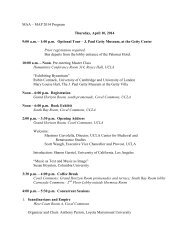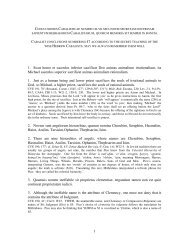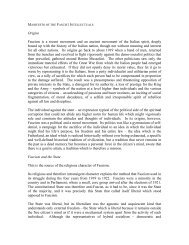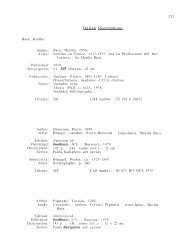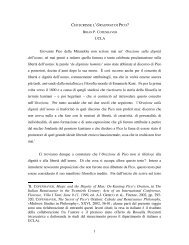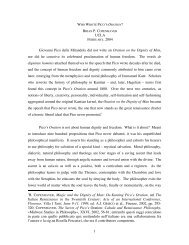1 (1) Pythagoras of Samos instructed the region of Italy once called ...
1 (1) Pythagoras of Samos instructed the region of Italy once called ...
1 (1) Pythagoras of Samos instructed the region of Italy once called ...
You also want an ePaper? Increase the reach of your titles
YUMPU automatically turns print PDFs into web optimized ePapers that Google loves.
8 ON THE SOUL<br />
(1) Although Aristotle rejects everyone’s view as absurd, he has what amounts to <strong>the</strong><br />
most absurd position <strong>of</strong> all when he gives soul to trees and plants. Poets, who are granted<br />
<strong>the</strong> broadest license <strong>of</strong> expression, seem more modest about this in claiming that <strong>the</strong> trees<br />
and bushes that <strong>the</strong>y describe as living have a mind, and that in <strong>the</strong> trees are goddesses<br />
<strong>called</strong> ‘hamadryads’ because <strong>the</strong>y appear and disappear toge<strong>the</strong>r with <strong>the</strong> trees. 148<br />
What does it actually mean to distinguish ‘animals’ from ‘animate bodies,’ which no one<br />
has done but <strong>the</strong> tribe <strong>of</strong> sophists? 149 (2) An ‘animal’ is so <strong>called</strong> because a soul<br />
‘animates’ it, and <strong>the</strong> ‘inanimate’ is not an ‘animal.’ These terms are actually nothing<br />
more than ‘animate’ and ‘inanimate,’ and <strong>the</strong> one expression adds nothing to <strong>the</strong> o<strong>the</strong>r,<br />
for all <strong>the</strong> learned Latin writers use ‘animal’ and ‘inanimate’ as contraries, and <strong>the</strong>y think<br />
<strong>the</strong>re is no difference between calling something ‘inanimate’ or ‘unanimated.’ But surely<br />
‘animal’ is no different than what is ‘animating’ or ‘something animal.’ Things that are<br />
‘animal’ or ‘animate,’ however – which is how many <strong>of</strong> <strong>the</strong> ancients described <strong>the</strong> world<br />
– how are <strong>the</strong>y different from ‘animals’? This is why those same ancients <strong>called</strong> <strong>the</strong><br />
world an ‘animal.’ Whatever is ‘animate,’ <strong>the</strong>n, or ‘animating’ or ‘something animal’<br />
will be an ‘animal.’<br />
(3) Thus, according to Aristotle, plants are animals. Why? Because he plainly <strong>called</strong><br />
<strong>the</strong>m ‘animals’ in his books On <strong>the</strong> Generation <strong>of</strong> Animals? 150 Or because a zôon is said<br />
to be from ‘living,’ apo tou zên, not from ‘soul,’ and so it seems not unreasonable that he<br />
could have given life to those things that seem somehow to live and die? Not at all. For<br />
it is not that plants, seeming somehow to be alive, should have been <strong>called</strong> zôa; on <strong>the</strong><br />
contrary, because <strong>the</strong>y are not zôa (a name that no one previously used for trees, to <strong>the</strong><br />
best <strong>of</strong> my knowledge), <strong>the</strong>refore <strong>the</strong>y should have been <strong>called</strong> not alive, except that it<br />
sometimes helps to speak metaphorically – ‘eau de vie,’ ‘quicksilver,’ ‘live sulphur,’<br />
‘quicklime,’ ‘living rock.’<br />
(4) Sacred scripture sometimes speaks this way, as Gregory explains: ‘Plants and bushes<br />
are alive, yes, but <strong>the</strong>y do not feel.’ I say <strong>the</strong>y do not live because <strong>of</strong> a soul but because<br />
<strong>of</strong> liveliness, since Paul also says: ‘Fool, it gives life to its seeds only by dying.’ It lives<br />
by dying, <strong>the</strong>n, in order to give life. 151 (5) Finally, <strong>the</strong>se ‘animals’ or ‘animate bodies’ <strong>of</strong><br />
Aristotle’s have no consciousness. And if we look at <strong>the</strong> origin <strong>of</strong> <strong>the</strong> word, <strong>the</strong> soul gets<br />
its name apo tou anemou, from a ‘breath’ or a ‘breeze,’ which is why we say ‘hold your<br />
breath’ for ‘restrain yourself’ and many such expressions. In <strong>the</strong> end, even though trees,<br />
bushes and plants are said to live, <strong>the</strong>y are really not said to live by a soul; o<strong>the</strong>rwise,<br />
<strong>the</strong>re would be as many souls in my body as <strong>the</strong>re are hairs, and more in <strong>the</strong> body <strong>of</strong> a<br />
beast where <strong>the</strong>re are more hairs. But it is ridiculous even to say so.<br />
148 Zippel cites Arist. An. 411b27-30, Part an. 655b30-56a1.<br />
149 Zippel cites Boethius, In Porph. dialogus secundus (PLM 64:51).<br />
150 Zippel cites Arist. Gen. an. 757 b 16-18.<br />
151 Zippel cites Greg. Nys. De hom. opificio 8 (PGM 44:146); I Cor. 15:36.<br />
40<br />
2/21/05 9:35 PM 40/44



